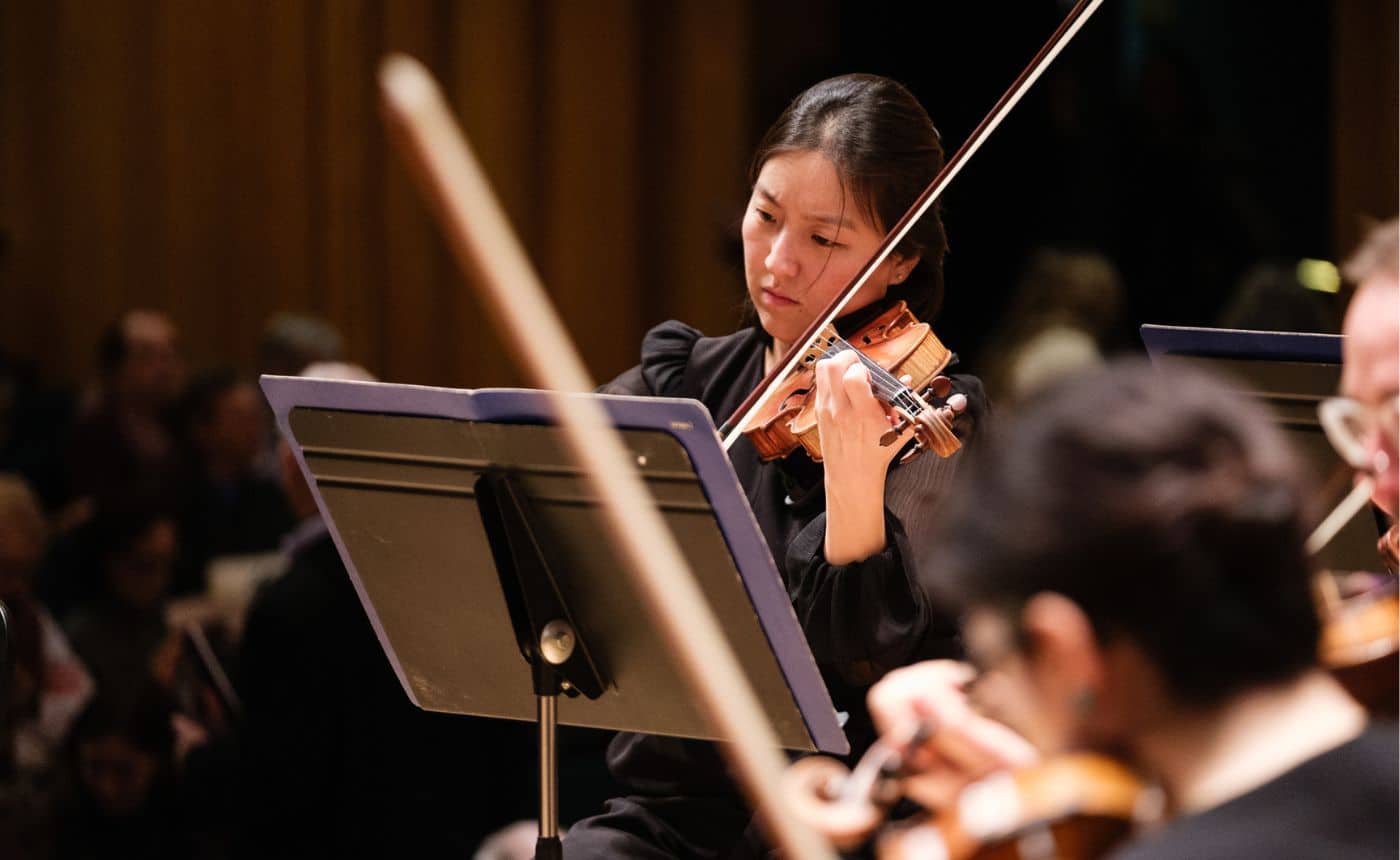Beethoven Online CoursePart 3 – The Immortal Beloved
by Jeffrey Dee Olpin

Ludwig van Beethoven
Beethoven, after coming to terms with his failing hearing, entered an extremely fruitful and productive phase in his career, otherwise known as the “Heroic” period. After his return from Heiligenstadt, a notable pupil, Carl Czerny, recalls Beethoven exclaiming:
“I am not satisfied with the work I have done so far. From now on I intend to take a new way.”
This middle period, spanning 1803-1815, is characterized by a high level of musical maturity. Works from this period are generally larger in scale, longer in duration, and overall more complex when compared to prior works. Notable works from this period include his only opera, an oratorio, a mass, six symphonies (Symphonies 3-8), four concertos, five string quartets, three trios, three string sonatas, six piano sonatas and numerous other miscellaneous works. This middle “Heroic” phase roughly coincides with the rise and fall of Napoleon.
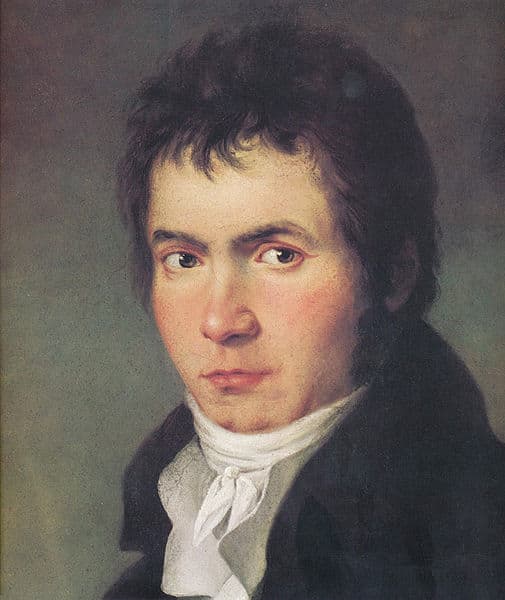
Ludwig van Beethoven, 1804
Beethoven’s most fruitful years were times of extreme political turbulence in France—years that had significant repercussions throughout Europe. The Elector of Bonn, Maximilian Franz, sponsored Beethoven during his initial years in Vienna. During the chaos of the French Revolution, one year after Beethoven’s arrival in Vienna, Franz would lose his elder sister, Marie Antoinette, to the guillotine in 1793.
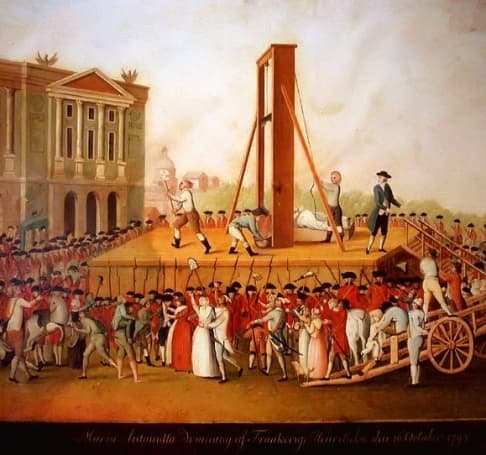
Marie Antoinette’s execution on October 16, 1793
Beethoven was a well-known champion of the common man, and fully embraced the ideas of democracy spilling out of France during the Revolution. Initially, Beethoven was an ardent fan of Napoleon Bonaparte (1769-1821), commending Napoleon’s ability to stabilize France following the Revolution. However, Beethoven’s attitude towards Napoleon, shared by many of Europe’s leading intellectuals, was extremely conflicted. Beethoven embarked on a love-hate relationship with Napoleon for the next twenty years. Napoleon himself noted that:
“Everybody has loved me and hated me: everybody has taken me up, dropped me, and taken me up again”

Napoleon Bonaparte
At first, Beethoven viewed Napoleon as the embodiment of the democratic ideals sweeping across Europe in the early 1800’s. Beethoven decided to dedicate his newly completed 3rd Symphony to Napoleon. However, when Napoleon declared himself “Emperor of the French” in May 1804, Beethoven was enraged. One of Beethoven’s pupils, Ferdinand Ries, recalled Beethoven’s response:
“At that time Beethoven had the highest esteem for him (Napoleon) and compared him to the greatest consuls of ancient Rome. Not only I, but many of Beethoven’s closer friends, saw this symphony on his table, beautifully copied in manuscript, with the word ‘Buonaparte’ inscribed at the very top of the title-page and ‘Ludwig van Beethoven’ at the very bottom. …I was the first to tell him the news that Buonaparte had declared himself Emperor, whereupon he broke into a rage and exclaimed, ‘So he is no more than a common mortal! Now, too, he will tread under foot all the rights of man, indulge only his ambition; now he will think himself superior to all men, become a tyrant!’ Beethoven went to the table, seized the top of the title-page, tore it in half and threw it on the floor. The page had to be re-copied and it was only now that the symphony received the title ‘Sinfonia Eroica.’”
Apparently, three months later, Beethoven had second thoughts. At that time, Beethoven wrote to his publisher: “The title of the symphony is really Bonaparte.” After several subsequent name changes and dedications, however, the 3rd Symphony simply became known as the “Eroica” (Italian for “heroic”) in 1806. Given this history, it seems, at least in Beethoven’s mind, the “Eroica” may or may not have been dedicated to Napoleon.
The “Eroica” is a milestone of symphonic repertoire given its unprecedented length and strong emotional content. Due to its avant-garde nature, the 3rd Symphony received mixed reviews at its premiere. As one music critic wrote: “Beethoven was doing for music what Napoleon was doing for society—turning tradition upside down.”
By 1809, Beethoven’s opinion of Napoleon again soured during Napoleon’s victory over Vienna. Beethoven was forced to hide in the basement of his brother’s house during the French bombardment of Vienna in May, 1809. Beethoven covered his ears with pillows to preserve the remnants of his hearing. He was composing his fifth and final piano concerto at the time, otherwise known as the “Emperor” Concerto.
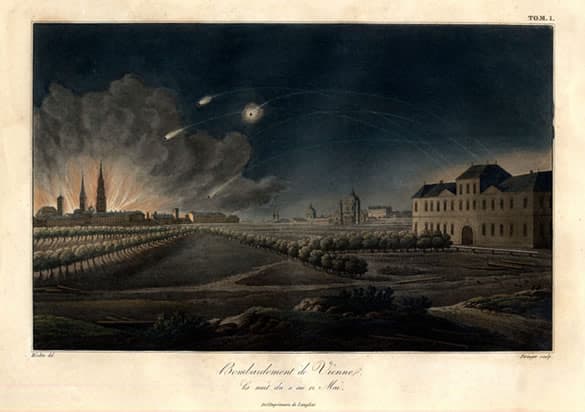
Bombardment of Vienna, May 12, 1809
Contrary to popular belief, the term “Emperor” has nothing to do with homage to Napoleon. Indeed, the term “Emperor” was not Beethoven’s own, but was coined by Johann Baptist Cramer, the English publisher of the concerto.
Although Beethoven had firmly established an extremely productive and fruitful career, his personal life remained troubled. Beethoven’s abrasive personality and volatile temper were notorious. He had a spectacular gift for alienating people. Regarding Beethoven’s demeanor, one acquaintance famously quoted: “the only thing predictable about Beethoven is his unpredictability.” Beethoven’s biographers are particularly intrigued by his series of failed relationships with women.
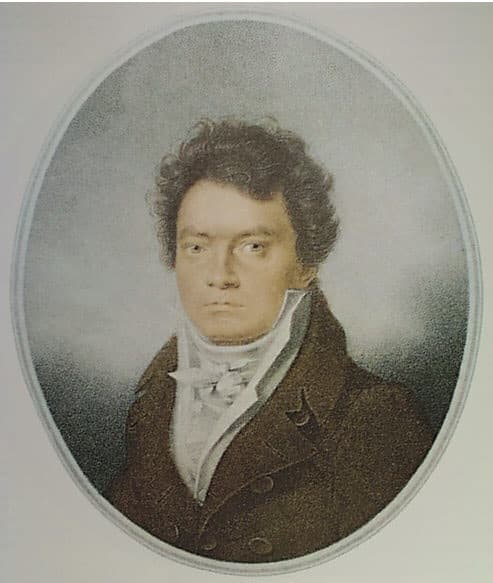
Ludwig van Beethoven, 1814
Much has been written regarding Beethoven’s romances, or lack thereof. Beethoven appears to have possessed many complex, mixed attitudes towards the opposite sex. There are several documented love-hate relationships with various women in Beethoven’s life. Early biographers have reliable, often eyewitness accounts that Beethoven was “very often in love,” but his “attachments were mostly of very brief duration.” Some historians posit Beethoven had a general disdain for marriage. This disposition might have been planted early in life after observing his parents’ rocky relationship.
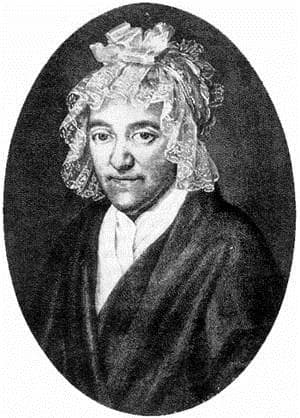
Maria Magdalena Keverich Beethoven, Frau van Beethoven
In fact, Beethoven’s mother may well have unwittingly poisoned any chance the composer would have for a healthy relationship. She held strong opinions on the subject of marriage. Cecilia Fischer, a friend of Beethoven’s mother, recalls Frau Beethoven’s response when discussing one of Cecilia’s potential suitors:
“If you want to take my good advice, remain single, and then you will have the most tranquil, most beautiful, most pleasurable life. For what is marriage? A little joy, then a chain of sorrows, and you are still young!”
Cecilia reported that young Ludwig was present when his mother dispensed the glum advice, and was apparently subjected to frequent anti-marital sentiments during the course of his young life.
In terms of Beethoven’s personal life, the mystery behind the “Immortal Beloved” has become a particularly intriguing, never-ending source for scholarly speculation. Following Beethoven’s death in 1827, a letter dated July 6-7 was found among his personal possessions. Missing from the letter were the year, the place of its composition, and, most importantly, the name of the intended recipient. They were addressed simply as “unsterbliche Geliebte” or “Immortal Beloved”.
For nearly 200 years, countless scholars have poured over this letter in an attempt to establish the identity of the Immortal Beloved. Through an analysis of the paper’s watermark, researchers in the 1950s were able to establish 1812 as the year in which the letter was written. Various records indicate Beethoven was in the Bohemian spa town of Teplitz in early July, 1812. Given the content of the letter, it seems Beethoven was writing to someone he had recently encountered, and was anticipating another meeting with the same woman in the near future. The tone of the letters is highly stylized and sentimental, as evidenced by the following excerpts:
July 6, in the morning
My angel, my all, my very self – can our love endure except through sacrifices, through not demanding everything from one another; can you change the fact that you are not wholly mine, I not wholly thine – My heart is full of so many things to say to you – there are moments when I feel that speech amounts to nothing at all. The gods must send us the rest, what for us must and shall be
Your faithful Ludwig
—
Evening, Monday, July 6
Ah, wherever I am, you are with me – I will arrange it with you and me that I can live with you. What a life!!! thus!!! without you. Is not our love truly a heavenly structure, and also as firm as the vault of Heaven?
—
Good morning, on July 7
Though still in bed, my thoughts go out to you, my Immortal Beloved – I am resolved to wander so long away from you until I can fly to your arms and say that I am really at home with you, and can send my soul enwrapped in you into the land of spirits. – Oh continue to love me – never misjudge the most faithful heart of your beloved.
Ever thine
Ever mine
Ever ours L.
There are several plausible, though perhaps not probable, candidates for the recipient of the letter. A potential “Immortal Beloved” candidate is Countess Giulietta Guicciardi. Beethoven met her around 1801. Apparently, Beethoven declared his love for the 17-year-old Giulietta after teaching her piano for several months.
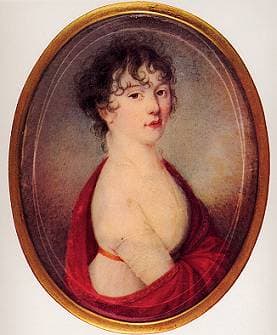
Countess Giulietta Guicciardi
Beethoven reportedly dedicated the Piano Sonata No. 14, otherwise known as the “Moonlight” Sonata, to Giulietta. Beethoven did not coin the term “Moonlight” to describe the sonata, but instead included the phrase “Quasi una fantasia” (almost a fantasy) to describe the dreamy, melancholy first movement. The term “Moonlight” was coined by music critic Ludwig Rellstab several years after Beethoven’s death in 1832. Rellstab felt the piece was evocative of “moonlight shining upon Lake Lucerne.”
Many scholars believe Guilietta accepted Beethoven’s marriage proposal. However, according to the 19th century Beethoven biographer Alexander Thayer, Guilietta’s father was firmly against the union when he described Beethoven as:
“without rank, fortune or permanent engagement; a man, too, of character and temperament so peculiar, and afflicted with the incipient stages of an infirmity which, if not arrested and cured, must deprive him of all hope of obtaining any high and remunerative official appointment and at length compel him to abandon his career as the great pianoforte virtuoso”.
Beethoven’s earliest and notoriously unreliable biographer Anton Schindler claims that Giulietta was the true “Immortal Beloved,” though modern scholars place little stock in any of Schindler’s assertions.
Another “Immortal Beloved” candidate is Therese von Brunsvik. Beethoven taught her piano as well, and dedicated the Piano Sonata Op 78 to her in 1809. A strong consensus of opinion existed in the late 19th century that Therese was the “Immortal Beloved.” In 1891, Marie Hrussoczy published Therese’s memoirs under the name “Beethoven’s Immortal Beloved: From Personal Reminiscences.”

Therese von Brunsvik
According to the author, Therese purportedly gave a vivid, melodramatic account of her torrid affair with Beethoven, including detailed plans of their secret engagement in 1806. The book was wildly popular, in spite of the fact the book was proven to be a complete fraud soon after publication. Some scholars also speculated she may have been the “Elise” for whom the piece “Fur Elise” was composed, given the fact Elise is a nickname of Therese, and that she once possessed the original score. Therese is notable not merely for her connection to Beethoven. In addition to her association with Beethoven, she is widely credited with the advent of nursery school, opening the first pre-school in Hungary in 1828. The term “kindergarten” was coined in 1837 after Germans capitalized on her idea.
A more plausible candidate for the Immortal Beloved, however, is a different Burnsvik—Josephine Brunsvik—Therese’s sister, and daughter of the Hungarian Countess Anna Brunsvik. Beethoven began teaching Josephine piano in May, 1799. Josephine married Count Josef Deym a short time later. Beethoven was a frequent household guest at the Deyms after their marriage. Josephine bore Deym four sons before his sudden death in 1804. Josephine corresponded with Beethoven throughout the course of their lives. Beethoven referred to her as his “Only Beloved” in earlier love letters. There are rumors her husband’s premature demise may have strengthened their relationship, though the depth of their romance is speculative.

Josephine von Brunsvik
The eminent Beethoven scholar, Maynard Solomon, narrowed the field further by eliminating these previously discussed candidates based on their whereabouts in early July, 1812. In his 1977 Beethoven biography, Solomon suggests Antonie Brentano is the only logical Immortal Beloved candidate. Antonie’s husband, Frankfurt banker Franz Brentano, became a close friend of Beethoven’s during the family’s two-year stay in Vienna. Antonie met Beethoven through her husband in 1810. Prudish Victorian Era scholars were either unwilling or unable to entertain the possibility of Antonie as the Immortal Beloved given the fact she was married. Beethoven stopped over in Prague on July 3, 1812, while on his way to Teplitz. Antonie and Franz were in Prague on the same day as evidenced by a hotel registry, just days before Beethoven composed the letters.
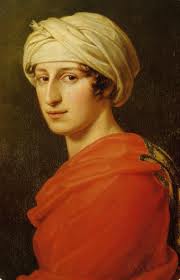
Antonie Brentano
It is speculated Beethoven and Antonie were planning to unite in Teplitz shortly after the letters were written. However, Solomon suggests that Beethoven, though deeply in love with Antonie, was unwilling to consummate a relationship given her marital status and his admiration for her husband.
With a dearth of precise information, the exact identity of the Immortal Beloved can never be firmly established. Present scholars remain deeply divided as to the identity of the Immortal Beloved, though most serious scholars agree the two most likely candidates are Josephine Brunsvik and Antonie Brentano.
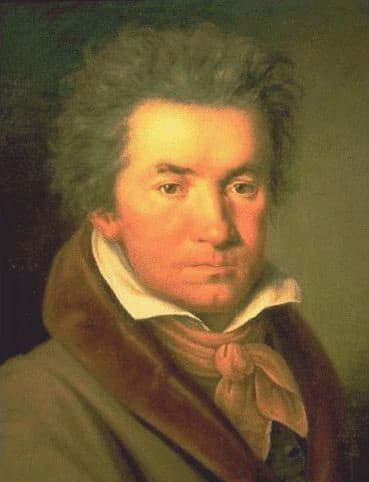
Ludwig van Beethoven, 1815
By 1812, as this middle period of Beethoven’s life neared its end, Beethoven was suffering from a variety of physical ailments. His compositional output began to decline as his appearance became progressively disheveled during the final years of the “Heroic” phase. Furthermore, his personal life would continue to falter. Following his unsuccessful romantic endeavors, he was about to become embroiled in family matters that would occupy a great deal of his time and effort during the final decade of life.
About the Author
Jeffrey Dee Olpin, M.D., is a native of Pleasant Grove, Utah. He began violin instruction at the age of six. Prior to his college studies, Jeff’s musical training consisted of personal instruction with David Dalton and Percy Kalt, both faculty members with the Department of Music at Brigham Young University. Jeff pursued a Bachelors Degree in Music Performance at Brigham Young University. Subsequently, he received a Masters Degree in Music Performance at the Yale School of Music. Although passionate about music, Jeff ultimately chose a career in medicine. He graduated from the Tulane University School of Medicine in New Orleans, Louisiana, followed by residency training in Diagnostic Radiology at Beth Israel Medical Center in New York City. He then pursued a fellowship in Abdominal Imaging at the University of California, San Francisco. Currently, Jeff is an Associate Professor of Diagnostic Radiology at the University of Utah Health Sciences Center. He resides in Bountiful, Utah, with his wife and two children.




